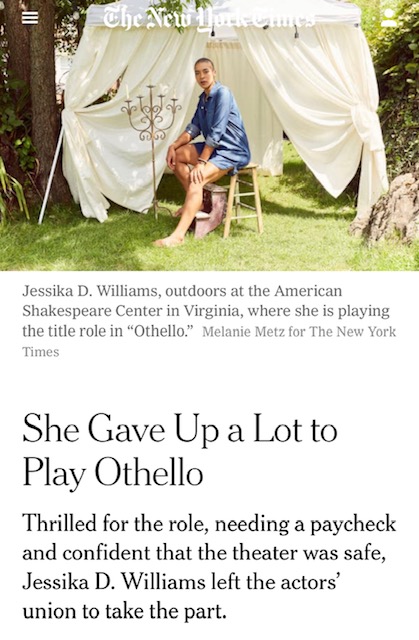The question we have to ask as teachers and theater artists today is, are Shakespeare’s plays still worth it, or should we stop giving them their hours on the stage?
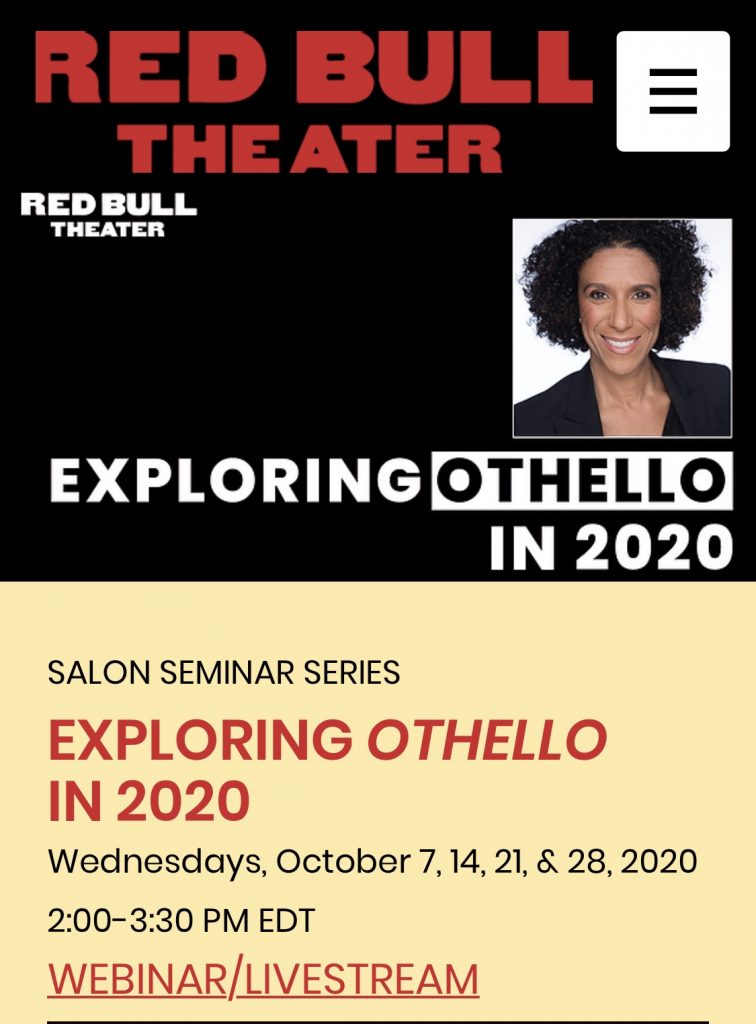
“Shakespeare is not spinach.
It is not always
good for you.”
~ Ayanna Thompson
Othello was one of my first Shakespeare plays as a teacher trainee. It was on the syllabus for the AP English course I co-taught with my mentor, Mrs. Esther. She had attended an AP conference with the great Renee Shea who introduced literature from the Harlem Renaissance, Chinua Achebe, and Jhumpa Lahiri as pairings for AP practice essays. Esther brought these rich texts back to us at the Academy of the New Church and we began to develop ELA curriculum centering works from the African Diaspora.
When we analyzed the play with our students in 2003 we looked at the racist language, focused on the arms-length general topic of “othering”, Iago’s mental manipulation tactics, and the poisonous nature of jealousy. The play made me sick and it made me angry. I felt Othello was rankly abused, and that Emilia–who certainly has her moments spouting hard-earned wifely wisdom–was mortally foolish when it came to her own husband.
We watched scenes from the 1995 Laurence Fishburne film version, and I squirmed to see my beloved Kenneth Branagh (the adorable Benedick from the 1993 classroom classic film version of Much Ado About Nothing) morphed into the repugnant, slimy, ironically monikered “honest Iago.” I confess my naive wonder at why anyone would want to play such a wicked reprehensible character. I mean, you hear actors say that it can be more fun to play a villain than a good guy, but Iago’s level of evil felt foul and infectious. To watch, much less embody.
I had had the same reaction when I saw Liev Schreiber play Iago a few years prior at the Public Theater. Worse, actually. In fact, while I’m sure Schreiber’s a lovely person with a true heart IRL, I have never quite gotten over how horrendously maleficent he was on stage. He was too good at being bad. He scared me like a ouija board should scare god-fearing adolescents. I had to look away.
Any high school examination of one of Shakespeare’s “Big Four” begs the identification of the tragic hero’s fatal flaw. Lear’s is arrogance. Macbeth’s is vaulting ambition that o’erleaps itself. The most obvious read of Othello is that the green-eyed monster of jealousy destroys Othello. But that never quite rang true to me. Yes, the respected Moorish General could have asked more questions of his rich young Venetian wife. No, Desdemona didn’t need to be so insistent about Cassio, and she certainly could have honestly admitted “actually I haven’t seen that handkerchief since I tried to bandage your head with it.” The plot line feels too soap opera. All based on dishonesty, assumption, and an embarrassing lack of fact checking. My early examinations saw Othello as too malleable, too trusting, even gullible. If Othello had a tragic flaw it was believing Iago and allowing Iago’s lies to poison his mind.
A few years back at a talk on Othello at the Public Theater with renowned Shakespeare scholars Ayanna Thompson and James Shapiro, I was struck by Thompson’s statement that she doesn’t mind teaching it, but she’d be happy to never watch this play again. Like The Merchant of Venice and The Taming of the Shrew, the racist, anti-semitic, sexist language and ideas in these “toxic plays” have become increasingly offensive to the ear and heart as audiences, scholars, and theater artists talk more openly about the deeply damaging nature of continuing to put these storylines in the spotlight.
The question we have to ask as teachers and theater artists today is, are Shakespeare’s plays still worth it, or should we stop giving them their hours on the stage? Should we continue to revere the work of the quintessential Dead White Man as core and canonical?
As Thompson said at a teaching seminar at the Public earlier this year, “Shakespeare is not spinach. It is not always good for you.” And yet there is a school of thought that wonders how the plays–even the overtly toxic ones–can be used today as entres to deep and valuable discussions. As writer-actor-director Madeline Sayet suggests, “Shakespeare plays should only be done with conversations that grapple with the issues they present.”
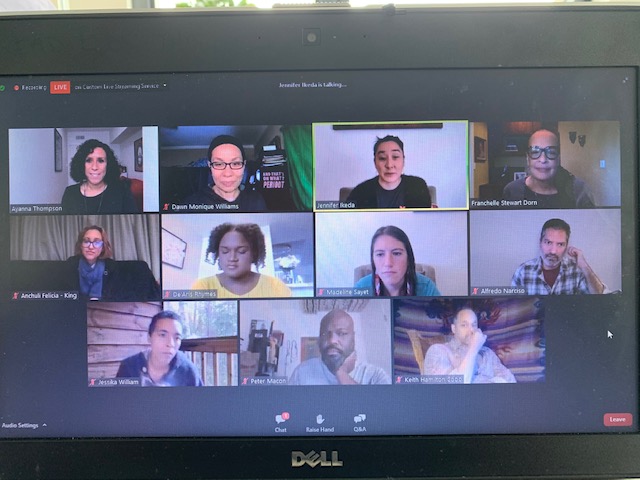
For the past four weeks I’ve had the good fortune to be a fly on the wall at the Red Bull Theater’s Salon Seminar Series EXPLORING OTHELLO IN 2020. Red Bull brought together a cast of richly experienced BIPOC theater artists to read and discuss Othello with Professor Thompson. To be privy to these conversations is one of the most enriching educational experiences I’ve had in quite a while.
It seems paradoxical that digging deeply into a play of such ugliness and hate would be a bright light in a dark time (the play is deeply disturbing and the slimy antagonist is a pernicious soul, indeed) but the classroom has always been a great hiding place for me. As I discovered while I was teaching Hamlet (I play I thought I knew pretty well) as my father died, there is something grounding and almost escapist in making a deep plunge into the layers of complexity Shakespeare’s plays provide.
In four 90-minute sessions director Dawn Monique Williams sets up each scene and assigns changing roles. Between scenes the actors ask each other questions about their readings and explore each other’s interpretive choices of the characters. What results is a deep interrogation of the play.
If you want more insight into Othello, the psychic cost of playing these roles, and the magnitude of continuing to study and produce it, sit back and listen to these BIPOC voices table read, workshop and deconstruct this play. As actor Peter Macon said, “it’s deeply illuminating how necessary this process is.”
I’m tempted to describe in detail how enjoyable it was to listen to people, with much more knowledge and experience than I, talking about Shakespeare. But it doesn’t feel right, somehow, to summarize what I learned, since the soul-deepening experience was purely a result of the generosity of these actors and scholars. You should listen to them yourself.
https://www.redbulltheater.com/exploring-othello-2020
#AnchuliFeliciaKing @anchulifeliciaking #KeithHamiltonCobb @keithhamcobb @khc_americanmoor #JenniferIkeda @ikedamame #PeterMacon @peterjerrodmacon #AlfredoNarciso @alfredonarciso #De’ArisRhymes #MadelineSayet @madsay #francellestewartdorn #AyannaThompson #DawnMoniqueWilliams @dmw_directs #JessikaDWilliams @jwfuhwhat #redbulltheater @redbulltheater
#shakespeare #teachingshakespeare #othello
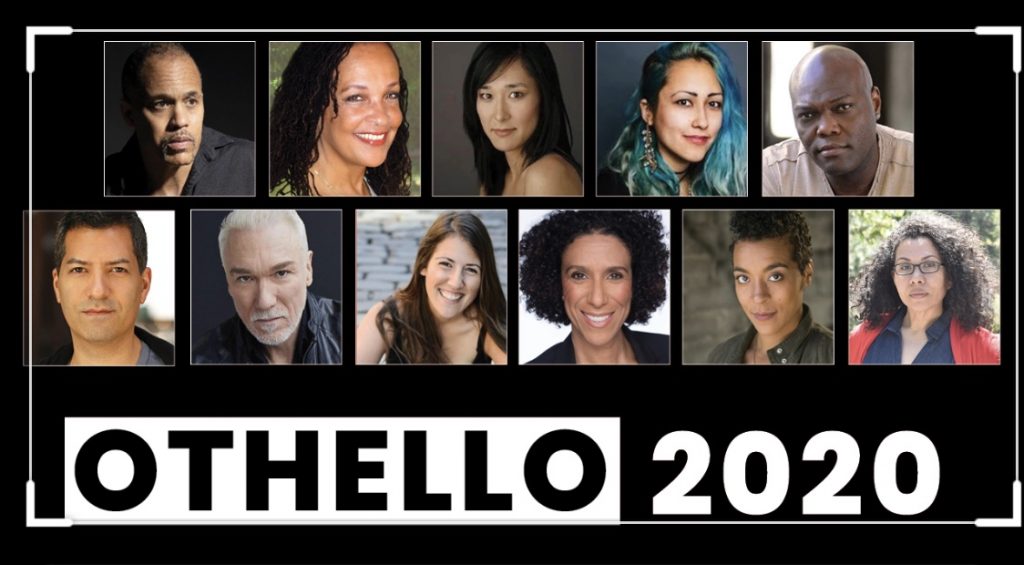
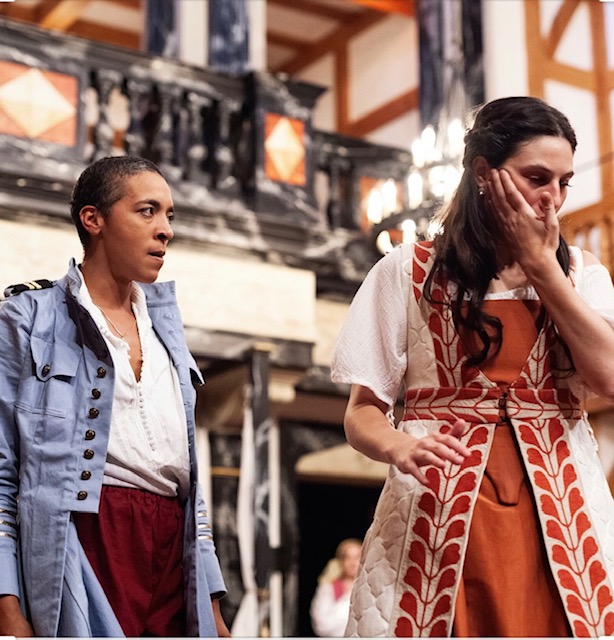
Jessika D. Williams, left, as Othello at the American Shakespeare Center, 2019-2020.
